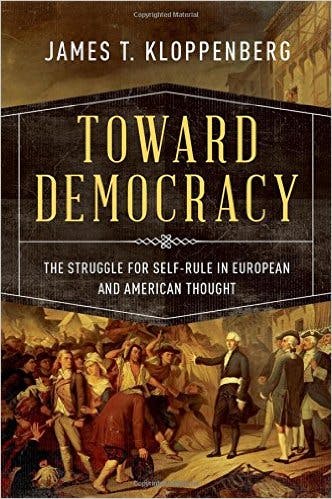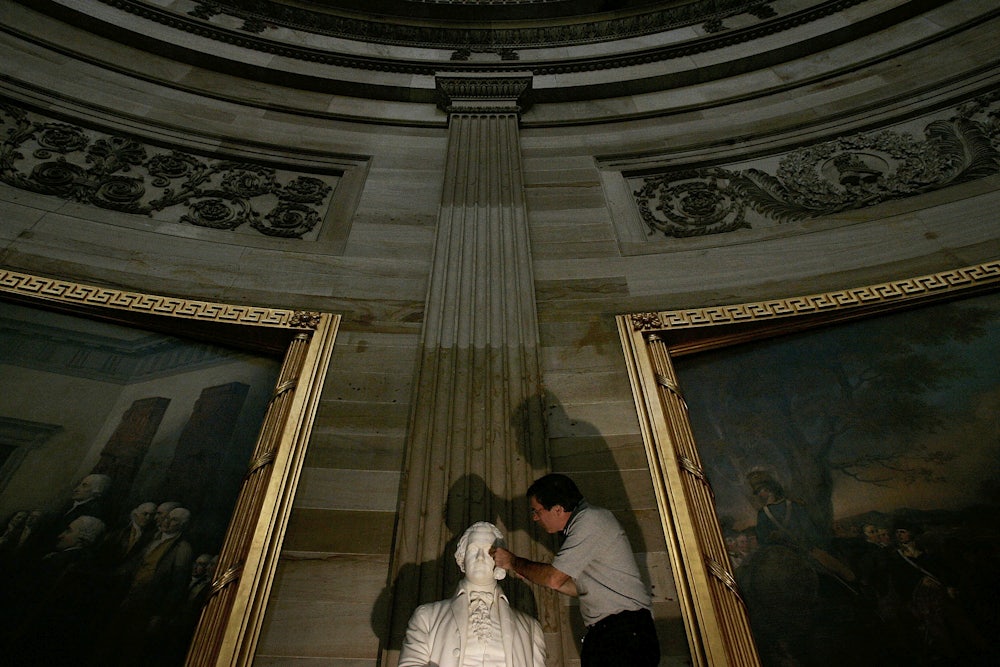When American voters exercise their democratic right this November, many will do so with little enthusiasm. Plenty more won’t vote at all. Fewer and fewer elite commentators mask their desire to replace the tiresome whims of ordinary voters with the technocratic rule of experts, algorithms, or markets. Anti-political movements of the right, including many of Donald Trump’s supporters, promise not popular power but a renewal of national greatness under strong, no-nonsense, deal-making leaders. Bernie Sanders and Jeremy Corbyn may have called for a “democratic revolution,” but that rhetoric is a descant to their more resonant theme: the necessity of economic realignment. Democracy stands in need not just of champions, but prophets.

Harvard historian James T. Kloppenberg’s latest book Toward Democracy lays out a distinctive vision of democracy—one that stresses not institutions or practices, but what he calls “an ethical ideal.” The essence of democracy isn’t one man, one vote. It isn’t majority rule. And it isn’t the principle of political representation. Rather, it lies in the combination of individual autonomy and an “ethic of reciprocity.” In other words, a willingness to think in other people’s shoes and act accordingly, a political version of the golden rule. If such ideals seem practically utopian in today’s climate, for Kloppenberg that is an indication of just how badly democracy has lost its way.
Across democracy’s long history, he argues, two tendencies have vied with each other. On one side there is the ethic of reciprocity, and on the other the temptations of rupture and revolution. Kloppenberg sees the era of America’s founding as an apotheosis of his democratic vision, and the guillotine in France as its hubristic turning-point, the beginning of a long decline. The French Revolution was a “tragedy,” he writes, whose “legacy has continued to poison democratic politics.” If there is a way back toward the ethical ideal that constitutes a true democracy, then it lies in recapturing the spirit of an earlier moment, an eighteenth-century moment of progress and possibility.
Back then, “the democratic current was rising fast,” he writes. Thanks to the “hardheaded realism” of men like John Adams, and James Madison’s appreciation for “the value of deliberation, pluralism, and reciprocity,” the American Revolution saw the first flourishing of modern democracy. Contrary to some modern commentators, neither man saw an important distinction between republican and democratic forms of government. While they stood firm against licentiousness, they also aimed at “nourishing a culture of democracy.” Madison’s great contribution to the science of politics was to take class out of the picture. As Kloppenberg explains, there was no relevant division between people and elites. There were just “complicated citizens whose nuanced, shifting, and internally inconsistent preferences and aspirations were irreducible to their current economic positions.”
This effacement of class politics is crucial to Kloppenberg’s pacific vision of reciprocal democracy, a vision that has no place for objectively conflicting interests. In his ideal democracy, all citizens would maintain both individual autonomy and a strong bond of sympathy with others. Together, through reasoned discussion—at least among elected representatives—they would reach an understanding of collective needs. In the book’s most striking passage of interpretation, Kloppenberg attributes this view to Jean-Jacques Rousseau. “The general will,” he quotes, “is always for the side most favorable to the public interest.” If one could only strip away “the filters of particular interest,” perhaps through better public education and electoral representation, the common good would become visible. Rousseau, it seems, was a liberal after all.
Kloppenberg’s portrayal of Rousseau would have sounded familiar to American Whigs like Noah Webster, who became a devotee of Rousseau in the 1780s. What turned things around, and gave Rousseau a lasting reputation as a radical, was the disaster that became of the French Revolution. Twisting Rousseau’s philosophy into the engine of the Terror, Maximilien Robespierre and other Jacobins “misunderstood the meaning and mechanics of self-government,” as well as the moderation of their intellectual forebear. What happened in France in the 1790s not only poisoned Rousseau’s name in America (where Webster disavowed his earlier essay), but it also spoiled the inheritance of enlightened democracy that might have been America’s gift to the world.
While the revolution in France was doomed to set off an era of anti-democratic reaction throughout Europe, the ethic of reciprocity was also undermined in the nineteenth century by an intensification of individual and particular interests. Capitalist markets and narrowly-conceived party-political movements share the blame, alongside adroit conservatives and reckless, self-defeating left-wing radicals. Andrew Jackson, the first president to fully embrace the label Democrat, was in reality the leader of a movement for “white male supremacy.” Kloppenberg recounts the expansion of suffrage, what John Stuart Mill identified as the “slow and steady ‘wearing away’ of distinctions separating citizens by rank or by birth,” principally as a distraction from the steady corruption of the public spirit. By the last quarter of the century, he sees the failure of democratic ideals in untrammeled individualism and instrumental rationality.
If Kloppenberg is a prophet of democracy, he casts himself as a Jeremiah, not an Isaiah—this is a story of waywardness rather than of redemption. To anyone despairing about democratic culture in the age of Trump and Brexit, Kloppenberg’s declension narrative will ring dolefully true. Toward Democracy aspires to a world of rational and autonomous yet sympathetic and virtuous citizens, imbued with the notion of a public interest, and prepared to strive for it against the pull of baser motives. That is not the world we live in. We began to fall, Kloppenberg argues, as soon as we lost faith in the idea of an inclusive common good.
But it’s precisely here that his vision is most blurred. More than once towards the end of the book, Kloppenberg elides the concept of class struggle with the demon of “simple self-interest.” In a paragraph about “the electorate’s increasing individualism,” for example, he describes how in 1864 “French workers clamored for working-class candidates who would advance their particular interests rather than those of the public as a whole.” Why the disconnect? Because his sense of democracy has no room for collective struggle or systemic conflict. It is a democracy of trade-offs between stakeholders, as a 21st-century James Madison might put it—or at best, earnest deliberation among disinterested representatives.
This attitude also reveals itself in Kloppenberg’s approach to the Civil War. Of course, he lauds Abraham Lincoln as a democrat who rejected straightforward majority-rule. But his consensual framework forces him to shy away from the revolutionary nature of the war, emphasized by recent historians like James Oakes. There is no greater story of collective struggle and conflicting interests in the nineteenth-century United States. Yet Kloppenberg distinguishes the war that Lincoln fought from a concerted program of emancipation and equality. That really began, he says, after Lincoln’s death, with Radical Reconstruction—a moment comparable to the Terror for the counter-revolutionary backlash it supposedly unleashed. The excesses of confrontation represented by both Radical Reconstruction and the Paris Commune render them anathema to Kloppenberg’s ethic of reciprocity.
There is something audacious in this attempt to frame democracy as essentially moderate and non-confrontational. That is not how most people in the late-eighteenth and nineteenth centuries saw it—which is part of Kloppenberg’s point. His close study of key democratic thinkers is a reminder that intellectual elites did not often share the attitudes of ordinary citizens. As these thinkers struggled to find ways of instilling liberal virtues, and avoiding the clash of conflicting interests, they sketched out the vision of democracy that Kloppenberg’s book tries to capture. Still the question remains: How much did this vision have in common with the actual practice of democracy? And what kind of appeal could it have, then and now, for those with no trust in political elites?
Toward Democracy concludes on an understandably downbeat note. By eschewing the radical tradition of democracy, Kloppenberg has ceded the ground of optimism that fueled democratic movements in the past. A very different kind of project will be needed to revive democracy as a rallying cry in contemporary public life—a project, most importantly, that is prepared to reckon with class struggle. Kloppenberg quotes the German historian Leopold von Ranke’s formulation of the quintessential democratic demand: “Power should come from below.” But below what? While nineteenth-century elites assumed a ruling class would always exist, workers set on foot collective, revolutionary efforts to abolish the whole structure of above and below. If we’re looking for a vision of democracy to dispel the present malaise, we would be better off taking inspiration from them.
